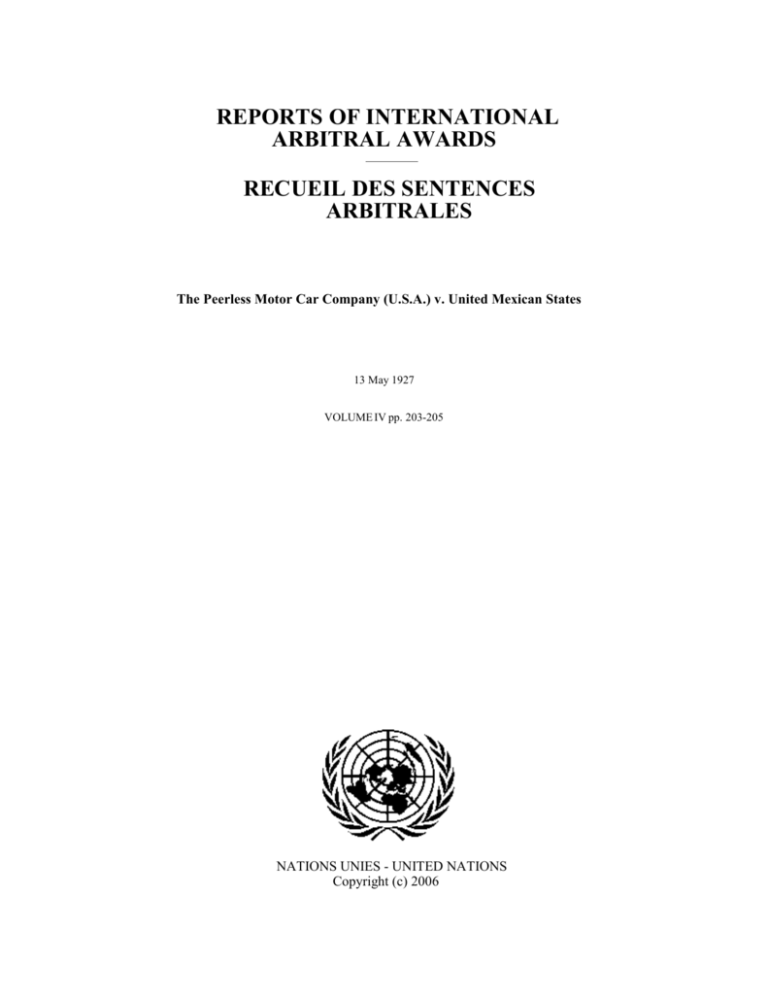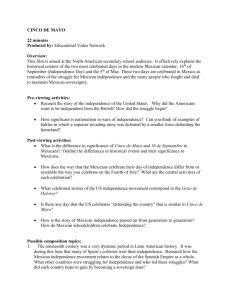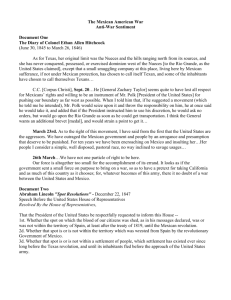203-205 - United Nations - Office of Legal Affairs
advertisement

REPORTS OF INTERNATIONAL ARBITRAL AWARDS RECUEIL DES SENTENCES ARBITRALES The Peerless Motor Car Company (U.S.A.) v. United Mexican States 13 May 1927 VOLUME IV pp. 203-205 NATIONS UNIES - UNITED NATIONS Copyright (c) 2006 MEXICO/U.S.A. (GENERAL CLAIMS COMMISSION) 203 Decision The Commission decides that the Government of the United Mexican Siates is obligated to pay to the Government of the United States of America on behalf of George Adams Kennedy the sum of $6,000.00 (six thousand dollars) without interest. HENRY RUSSELL et al. (U.S.A.) v. UNITED MEXICAN STATES. (May 9, 1927. Page 302.) Motions to amend answers granted in absence of opposition of adverse Agent. PROCEDURE, MOTION TO AMEND. (Text of decision omitted.) THE PEERLESS MOTOR CAR COMPANY (U.S.A.) v. UNITED MEXICAN STATES. (May 13, 1927, concurring opinions by Presiding Commissioner and Mexican Commissioner, May 13, 1927. Pages 303-305.) CONTRACT CLAIMS.—RESPONSIBILITY FOR ACTS OF DE FACTO GOVERNMENT. —CLAIM IN RESTITUTION. Claim for unpaid purchase price of two automobile ambulances sold and delivered to Mexican Government under contract made during Huerta regime allowed. Cross-references: Am. J. Int. Law. Vol. 22, 1928, p. 180; Annual Digest, 1927-1928, p. 246. Nielsen, Commissioner : 1. Claim is made in this case by the United States of America in behalf of the Peerless Motor Car Company, an American Corporation, to obtain payment of 23,000 Mexican pesos, which it is alleged is due as the purchase price of two automobile ambulances, under a contract entered into July 25, 1913, between the Mexican Government and the claimant. Interest on this sum is claimed from October 15, 1913. 2. The contract, a copy of which accompanies the Memorial (Annex 2), recites that it is executed in fulfillment of an order "of the Department of War and Navy, between the Chief of the Military Sanitary Section, Colonel Agustin Nieto y Mena, M. D., and Mr. Joseph M. Wheeler, merchant of this city [Mexico City] and representative of 'The Peerless Motor Car Company' ". By the third paragraph of the contract it is stipulated that payment for the ambulances shall be made "as soon as the said ambulances are duly received". Under date of October 15, 1913, a receipt for the ambulances bearing the signature of A. Nieto y Mena was delivered to Joseph 204 MEXICO/U.S.A. (GENERAL CLAIMS COMMISSION) M. Wheeler, the claimant's representative in Mexico City. In this receipt it is recited that the ambulances received are complete and satisfactory, and that payment will be made to Wheeler immediately (Annex 6 to the Memorial.) 3. In the arguments advanced before the Commission both Governments rely upon the decision rendered by the Commission in the Hopkins case, Docket No. 39. In behalf of the Government of Mexico it is not disputed that the automobiles were manufactured and delivered conformably to the terms of the contract, and that the purchase price has not been paid. But it is contended that there is no international responsibility on the Mexican Government for, as stated in the Answer, "the nonpayment of certain war material admitted by the claimant corporation to have been ordered by, and sold and delivered to an illegitimate administration", that is, the administration of General Victoriano Huerta. It is further alleged in the Answer that "even assuming that the legitimate government of the United Mexican States had subsequently to the sale and delivery of the war material aforesaid to the local de facto administration become possessed of the said war material, no liability could be predicated upon the said respondent government neither in international law, nor equity, nor justice, since the said possession was due to the recognized right that all legitimate governments possess to capture the war material of the enemy". 4. In the view I take of this case it is unnecessary to consider the point as to the responsibility of Mexico grounded on the contention of the United States that it may be assumed from the record that Mexican authorities in power following the administration of General Huerta made use of the cars delivered by the Company. Nor is it necessary to consider the Mexican Government's contention as to the character of the ambulances as war material. The United States contends, among other things, that the purchase of these motor ambulances was an unpersonal act, and that therefore, under the principles laid down in the Hopkins case, Docket No. 39, the Government of Mexico is liable for the purchase price of the ambulances. I am of the opinion that the conten tion is sound, and that an award should therefore be rendered in favor of the United States in the sum of 23,000 pesos with interest from October 15, 1913, the date on which the receipt for the ambulances was delivered to the claimant's representative at Mexico City. Van Vollenhoven, Presiding Commissioner : I concur in Commissioner Nielsen's conclusion with respect to the liability of Mexico. The purchase of ambulances, however, in my opinion is not a part of the ordinary routine of government business. It comes within the doubtful zone mentioned in paragraphs 5 and 6 of the opinion in the Hopkins case. As such, it is much more akin to a transaction of government routine (the one extreme) than to any kind of voluntary undertaking "having for its object the support of an individual or group of individuals seeking to maintain themselves in office" (the other extreme), and therefore should, under the principles laid down in the said opinion, be assimilated to the first group, to wit, the routine acts. Fernandez MacGregor, Commissioner: I concur in the opinions expressed by Commissioners Van Vollenhaven and Nielsen. MEXICO/U.S.A. (GENERAL CLAIMS COMMISSION) 205 Decision The Commission decides that the Government of the United Mexican States shall pay to the Government of the United States of America in behalf of the Peerless Motor Car Company the sum of $11,465.50 (eleven thousand four hundred and sixty-five dollars and fifty cents) together with interest on that sum at the rate of six per centum per annum from October 15, 1913, to the date on which the last award is rendered by the Commission. The said amount of $11,465.50 is the equivalent of 23,000.00 pesos for which claim is made. The Commission renders the award in the currency of the United States conformably to its practice in other cases of making all awards in a single currency, having in mind the purpose of avoiding future uncertainties with respect 1o rates of exchange which it appears the two Governments also had in mind in framing the first paragraph of Article IX of the Convention of September 8, 1923, with respect to the payment of the balance therein mentioned "in gold coin or its equivalent". TOBERMAN, MACKEY & COMPANY (U.S.A.) v. UNITED MEXICAN STATES. (May 20, 1927, concurring opinion by American Commissioner, May 20, 1927. Pages 306-311.) Respondent Government held not subject to obligation to take special care, of a standard commensurate with that of a private concern, of goods coming into the custody of its customs service and left with it beyond required period for withdrawal of goods. STANDARD OF CARE OF PROPERTY HELD IN CUSTODY. Cross-references: Am. J. Int. Law, Vol. 22, 1928, p. 182; Annual Digest, 1927-1928, p. 228; British Yearbook, Vol. 9, 1929, p. 157. Fernandez MacGregor, Commissioner : 1. This claim is presented by the United States of America in behalf of Toberman, Mackey & Company, an American corporation, demanding from the United Mexican States the sum of $1,845.57, with interest, the value of 376 bales of hay, property of claimants, which was damaged in the Mexican Custom House of Progreso, Yucatan, Mexico, between the beginning of June, 1919, and July 23, 1920. It is alleged that the hay in question became completely deteriorated by exposure to the weather, on account of the negligence or lack of care of the authorities of the Mexican Custom House. 2. The evidence presented in this case shows that Toberman, Mackey & Company, an American firm dealing in grains, seeds, fodder and other products, having previously received an order from the firm of Crespo and Suârez, of Progreso, shipped in New Orleans, Louisiana, U.S.A., on a Norwegian vessel, June 3, 1919, 376 bales of compressed hay, under a bill of lading issued by the Gulf Navigation Company, Inc. The shipment was consigned to shippers order, Crespo and Suârez to be notified upon






